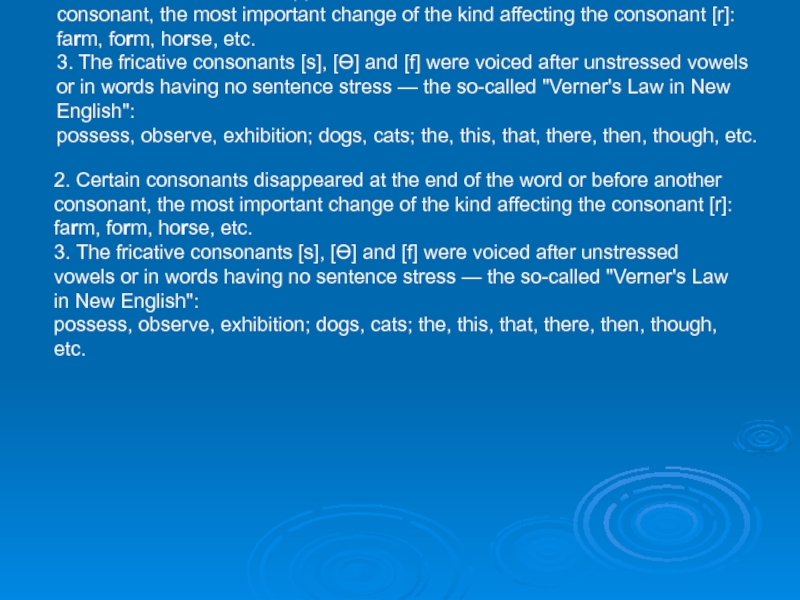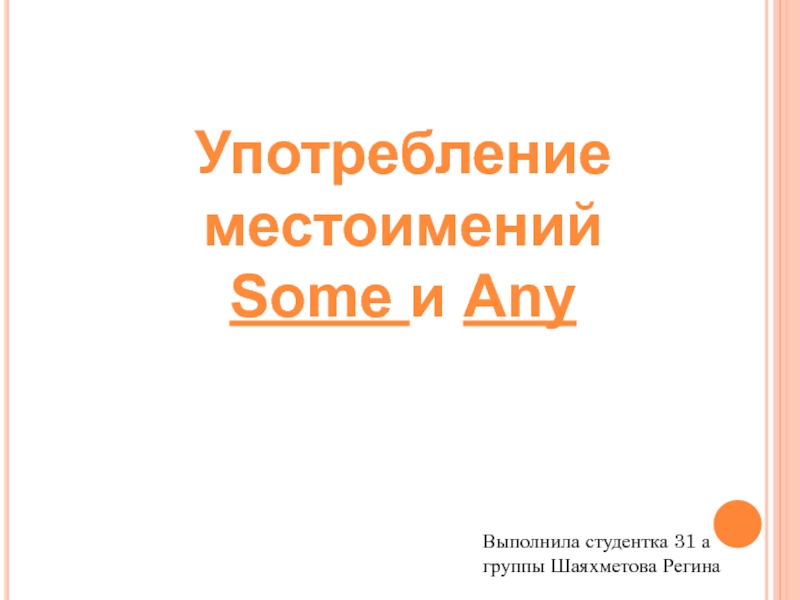- Главная
- Разное
- Дизайн
- Бизнес и предпринимательство
- Аналитика
- Образование
- Развлечения
- Красота и здоровье
- Финансы
- Государство
- Путешествия
- Спорт
- Недвижимость
- Армия
- Графика
- Культурология
- Еда и кулинария
- Лингвистика
- Английский язык
- Астрономия
- Алгебра
- Биология
- География
- Детские презентации
- Информатика
- История
- Литература
- Маркетинг
- Математика
- Медицина
- Менеджмент
- Музыка
- МХК
- Немецкий язык
- ОБЖ
- Обществознание
- Окружающий мир
- Педагогика
- Русский язык
- Технология
- Физика
- Философия
- Химия
- Шаблоны, картинки для презентаций
- Экология
- Экономика
- Юриспруденция
New English презентация
Содержание
- 1. New English
- 2. 1. External History. Formation of the National
- 3. 1.2. Development of the Literary Language 1611
- 4. Samuel Johnson 1709— 1784
- 5. 1.3. Expansion of English. The English Language
- 6. 1.4. 20th century. English as an International Language http://en.wikipedia.org/wiki/International_English
- 7. Early New English texts William Shakespeare http://molcat1.bl.uk/treasures/shakespeare/search.asp
- 8. 2. Internal History 1.1 Vocabulary of NE
- 9. 2.2 Phonetic Changes The changes that affected
- 10. VOWELS IN THE UNSTRESSED POSITION Vowels in
- 11. VOWELS UNDER STRESS Qualitative changes. Changes of
- 12. Middle English Two long close vowels:
- 13. INFLUENCE OF THE CONSONANT “R” UPON THE
- 14. The sound existed before the Shift As
- 15. Middle English Two short monophthongs changed their
- 16. Middle English However, these processes depended to
- 17. Middle English Changes of diphthongs Two out
- 18. Middle English Quantitative changes Short vowels followed
- 19. When the consonant [r] stood after
- 20. CONSONANTS 1) Appearance of a new consonant
- 21. 2. Certain consonants disappeared at the end
Слайд 21. External History. Formation of the National Language
1.1. Spread of London
The formation of a national language was mostly caused by
the Wars of the Roses (1455—1485)
the introduction of printing
http://en.wikipedia.org/wiki/William_Caxton
http://www.uni-duisburg-essen.de/SHE/HE_DialectsModernEnglish.htm
Слайд 31.2. Development of the Literary Language
1611 King James' Bible
http://en.wikipedia.org/wiki/King_James_Version_of_the_Bible
1621 Alexander
1685 Christopher Cooper. Grammatica Anglicana
1724 William Baker. Rules for True Spelling and Writing English
1755 Dr. Samuel Johnson. A Dictionary of the English Language
Слайд 51.3. Expansion of English. The English Language in America. Hybrid Languages
http://en.wikipedia.org/wiki/British_Empire
http://en.wikipedia.org/wiki/Mixed_language
Слайд 61.4. 20th century. English as an International Language
http://en.wikipedia.org/wiki/International_English
Слайд 7Early New English texts
William Shakespeare
http://molcat1.bl.uk/treasures/shakespeare/search.asp
Слайд 82. Internal History
1.1 Vocabulary of NE period
Enrichment of Vocabulary in the
Latinization of French Words
Greek Words
Borrowing of Colonial and French Words in the 17th Century
Слайд 92.2 Phonetic Changes
The changes that affected the vowel and the consonant
Vowels — Qualitative changes:
1. Disappearance of vowels in the unstressed position at the end of the word.
2. Changes of all long vowels — the Great Vowel Shift.
3. Changes of two short vowels: [a] > [æ] or [o] and [u] >[ʌ].
Vowels — Quantitative changes:
4. Changes of two diphthongs: [ai] > [ei], [au] > [o:].
5. Lengthening of vowels before [r] — due to the vocalization of consonants.
Consonants:
6. Appearance of the consonant [3] and the consonants [ʧ]>[d3] in new positions.
7. Disappearance or vocalization of the consonant [r].
8. Voicing of consonants — Verner's Law in New English.
9. Positional disappearance:
r vocalized at the end of the word: far
w before r write
к before n knight
h before t light
Слайд 10VOWELS IN THE UNSTRESSED POSITION
Vowels in the unstressed position already reduced
Слайд 11VOWELS UNDER STRESS
Qualitative changes. Changes of monophthongs
All long monophthongs in New
Слайд 12Middle English
Two long close vowels: [ū] and [ī] at first also
Consequently the process of the dissimilation of the elements [ī] and [ū] gave us the diphthongs [ai] and [au], respectively.
Слайд 13INFLUENCE OF THE CONSONANT “R” UPON THE GREAT VOWEL SHIFT
When a
Слайд 14The sound existed before the Shift
As a result of the Great
Слайд 15Middle English
Two short monophthongs changed their quality in new
English (XVII century),
the monophthong [u] becoming [ʌ].
Слайд 16Middle English
However, these processes depended to a certain extent upon the
Where the sound [u] was preceded by the consonants [p], [b] or [f], the change of [u] into [ʌ] generally did not take place
bull, butcher, pull, push, full, etc.
Слайд 17Middle English
Changes of diphthongs
Two out of the four Middle English diphthongs
Слайд 18Middle English
Quantitative changes
Short vowels followed by the consonant [r] became long
Слайд 19
When the consonant [r] stood after the vowels [e], [i], [u],
her
fir [ə:]
fur
or [h] before [t]: might, night, light.
Слайд 20CONSONANTS
1) Appearance of a new consonant in the system of English
Слайд 212. Certain consonants disappeared at the end of the word or
farm, form, horse, etc.
3. The fricative consonants [s], [Ө] and [f] were voiced after unstressed vowels or in words having no sentence stress — the so-called "Verner's Law in New English":
possess, observe, exhibition; dogs, cats; the, this, that, there, then, though, etc.
2. Certain consonants disappeared at the end of the word or before another consonant, the most important change of the kind affecting the consonant [r]:
farm, form, horse, etc.
3. The fricative consonants [s], [Ө] and [f] were voiced after unstressed vowels or in words having no sentence stress — the so-called "Verner's Law in New English":
possess, observe, exhibition; dogs, cats; the, this, that, there, then, though, etc.
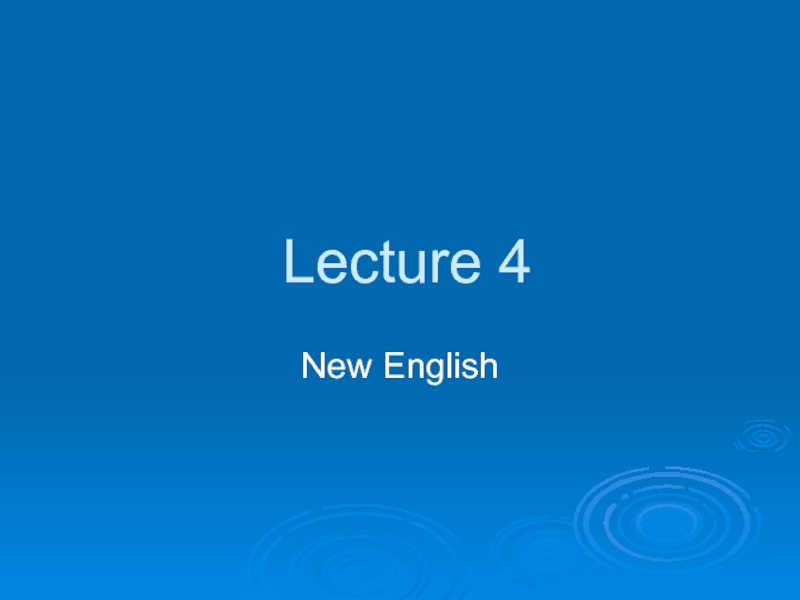
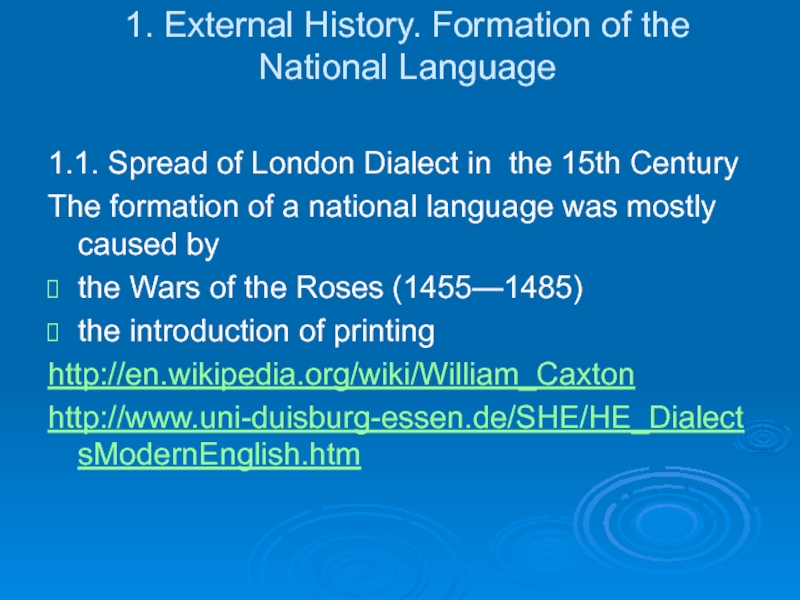
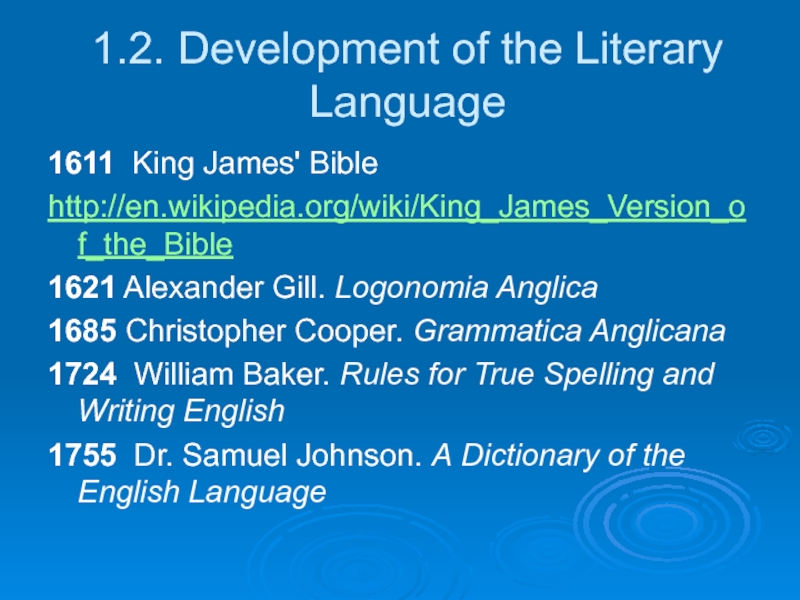
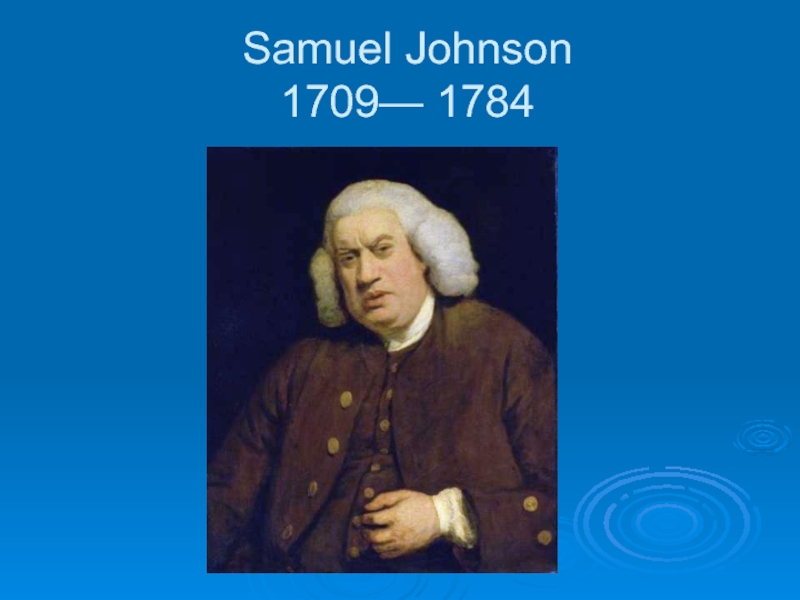
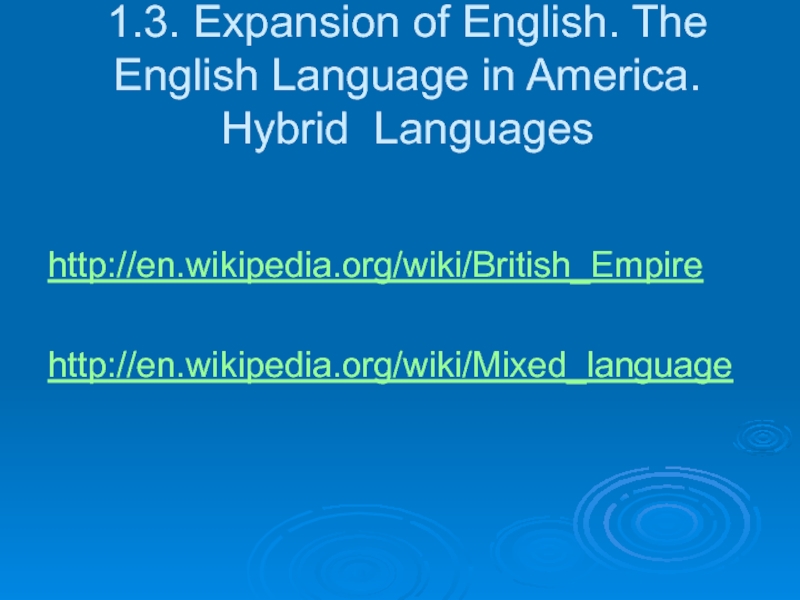


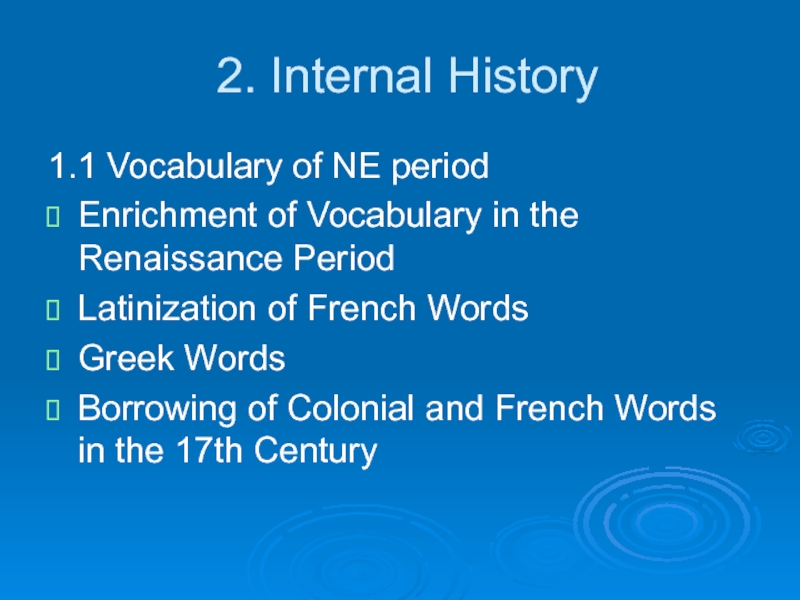
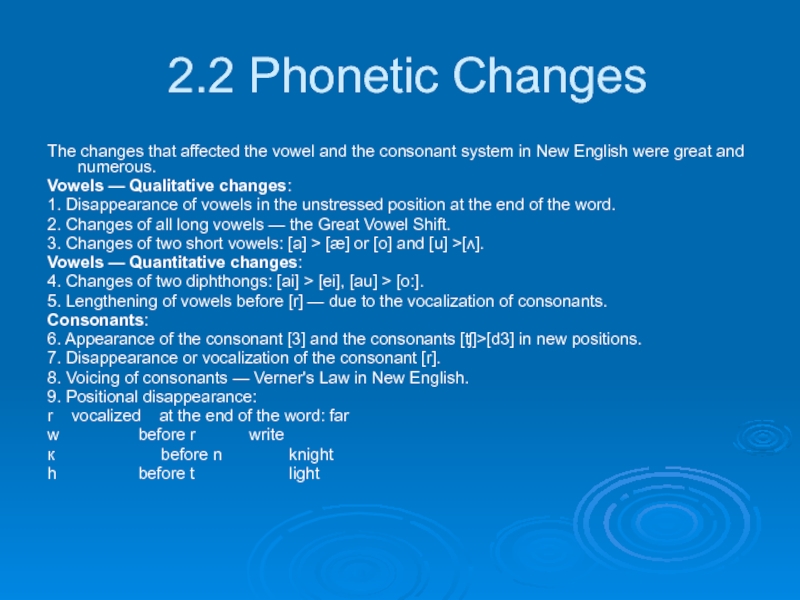
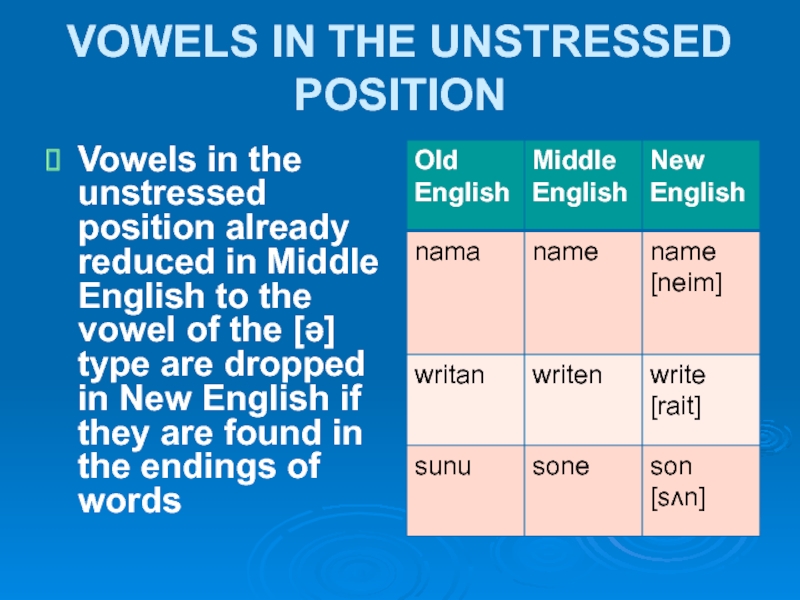
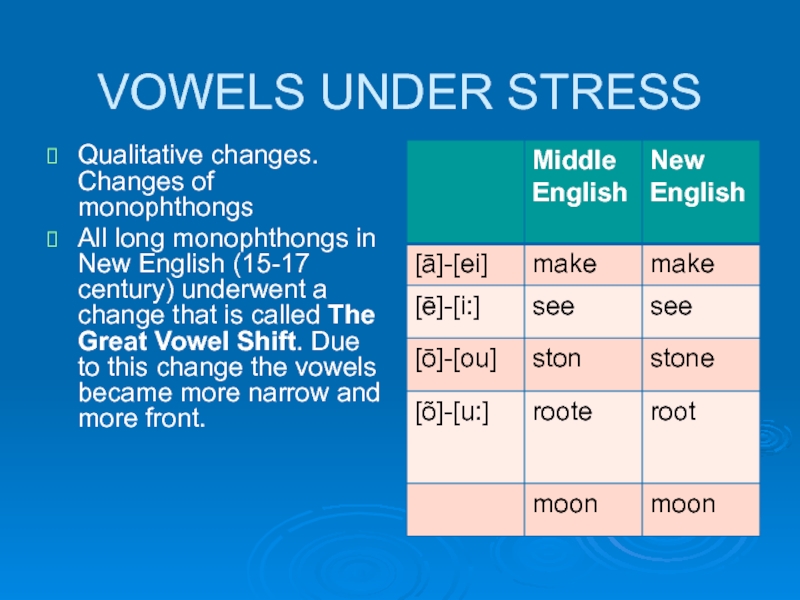
![Middle EnglishTwo long close vowels: [ū] and [ī] at first also became more narrow and](/img/tmb/6/508125/59483d96cff4d6813fe64f400211086b-800x.jpg)
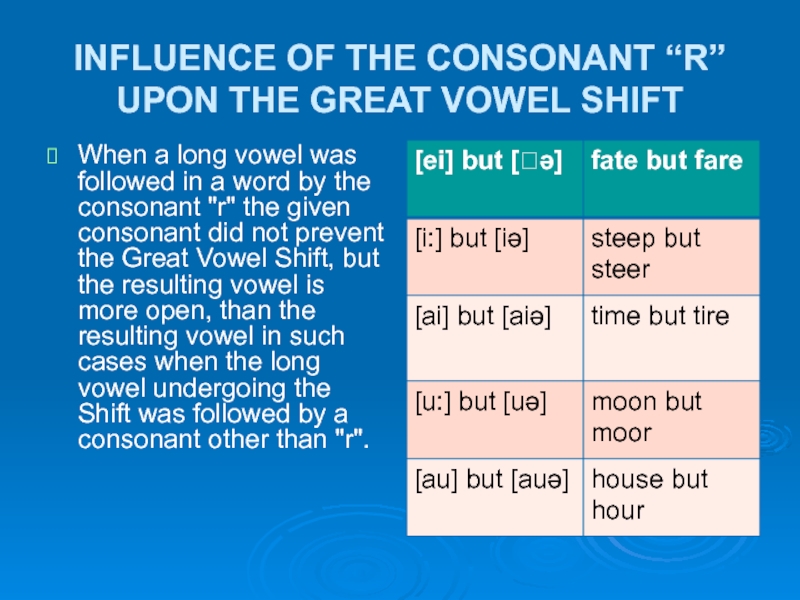
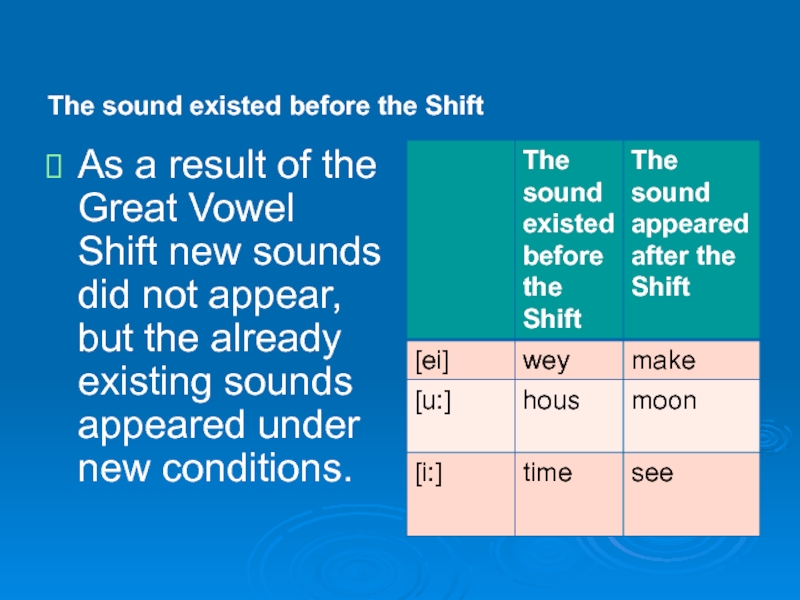
![Middle EnglishTwo short monophthongs changed their quality in newEnglish (XVII century), the monophthong [a] becoming](/img/tmb/6/508125/8be3f18f506b497244b175ff4a13835e-800x.jpg)
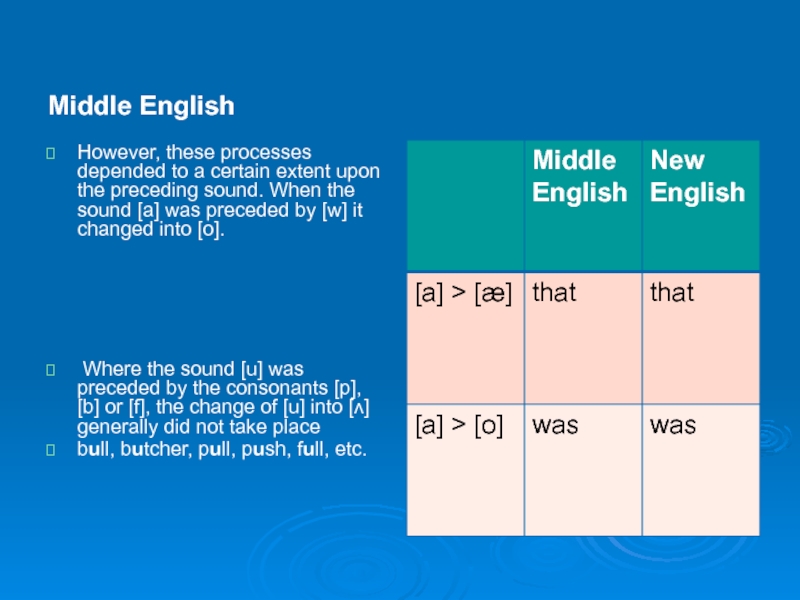
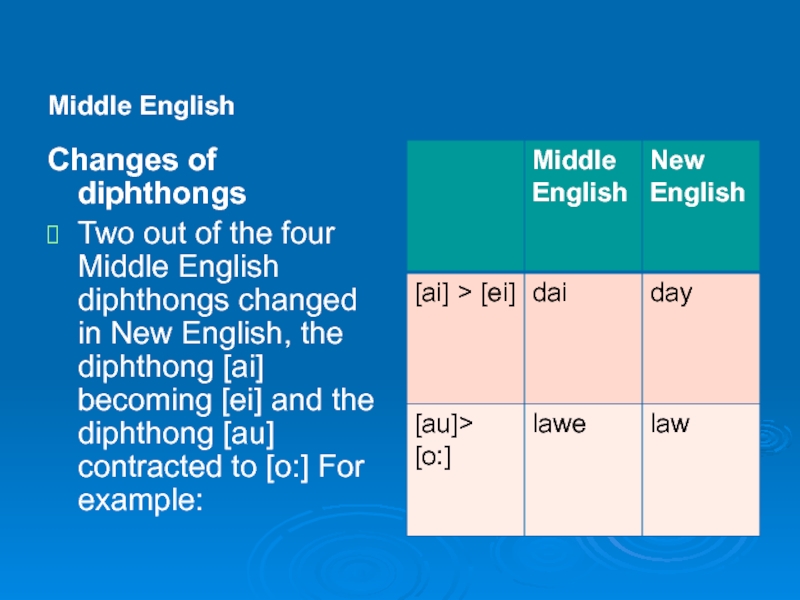
![Middle EnglishQuantitative changesShort vowels followed by the consonant [r] became long after the disappearance of](/img/tmb/6/508125/5ef8ba2df78e364cf7666cbc26510833-800x.jpg)
![When the consonant [r] stood after the vowels [e], [i], [u], the resulting vowel was](/img/tmb/6/508125/986293b8f7aa5318343fe13596be2453-800x.jpg)
![CONSONANTS1) Appearance of a new consonant in the system of English phonemes — [3] and](/img/tmb/6/508125/439a435c6c256a79eabed3de559bc5ce-800x.jpg)
